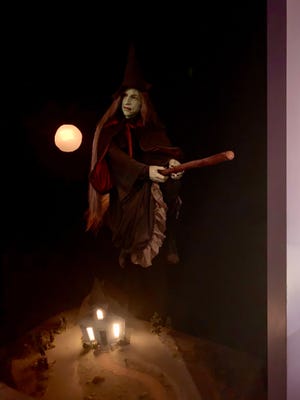What Can We Learn From the Salem Witch Trials

Equally Halloween approaches, many people'due south thoughts turn to witches, demons, and devils. For the last several years, I've spent many of my waking hours thinking well-nigh these sinister beings. I've been specially interested in their visit to the hamlet of Salem, Massachusetts.
Between Feb 1692 and May 1693, the residents of Salem accused more than 200 people of practicing witchcraft. Dozens were indicted, 19 of them were hanged, and still more perished in prison. 14 of those executed were women. The youngest of those imprisoned was less than five years sometime.
I teach a pocket-sized seminar on the bailiwick for start-yr students at the University of Michigan Law School. It turns out that the tragedy that unfolded at Salem tells us a lot about the police force. And, as University of Michigan alum Arthur Miller brilliantly conveyed in his play "The Crucible," the lessons of Salem are all cautionary tales.
In Salem, accused witches had no right to a lawyer. Every bit a issue, they could not cross examine their accusers, whose testimony went largely unchallenged despite numerous vulnerabilities. In the Salem seminar, my students and I imagine what such cross examinations might have sounded similar and why they might have made a difference.
The absenteeism of representation likewise meant that no lawyer pushed back against the examinations of the accused by John Hathorne, the magistrate who served as Salem'due south principal prosecutor. Hathorne was skilled at his job. For example, at one point during her testimony, the alleged sorceress Bridget Bishop blurted out that she didn't even know what a witch was. Hathorne retorted: "How do yous know then that you are not a witch?"
In my seminar, we spend a good deal of time analyzing and critiquing Hathorne'southward methods. Then it was awkward when I recently discovered that I am distantly related to him. Whatever i thinks of Hathorne as a person, his tenacity and doggedness as a lawyer cannot be denied, which but emphasizes the importance of the accused having an abet of her ain.
In improver, the rule against hearsay had non yet fully developed, so such show freely flowed into the Salem proceedings. Witnesses repeated the worst kinds of rumor and innuendo without interruption or objection. At some points, it becomes impossible to tell how many layers of hearsay the testimony includes.
Furthermore, the Salem trials welcomed prove almost the character of the accused. This makes a kind of perverse sense, since the primal question was whether the person was in league with the devil. As a upshot, the court happily received whatsoever evidence that only made the accused look bad. Petty wonder that and then many of the bedevilled were unpopular outliers from the margins of Salem social club.
Ironically, some of the legal principles that we count on to save us from error backfired in Salem. For example, the concept of precedent commonly provides stability and sensibility to the conclusion-making process, preventing wildly irrational aberrations. The Salem court, still, could rely on the grisly precedent of hundreds of years of European witch hunts to validate its proceedings.
Similarly, the concept of relevance usually keeps trials focused on the facts that actually impact the guilt or innocence of the accused. In Salem, however, relevance did more than impairment than good. Subsequently all, whether evidence qualifies as relevant depends on our understanding of reality: if we believe nonsense, then we will think absurdities are relevant to determining the truth.
For example, the people of Salem believed that a witch could not recite the Lord's Prayer without faltering. The inability of some of the accused to do so therefore confirmed their guilt. It made no difference that the failure could be easily explained by illiteracy, fluency, stress, or mental incapacity. And when one of the accused did manage to recite the prayer flawlessly, the Salem religious leader Cotton fiber Mather shrugged it off as an example of the devil's ability to deceive.
The proceedings in Salem offer many other lessons as well. They confirm the importance of impartial judges (the Salem magistrates were anything but). They reveal the dangers of merging church building and state (the Salem law echoed an injunction from the book of Exodus). They underscore the importance of a stable judicial structure (the Salem courts were an ill-conceived improvisation).
Simply Salem's most important pedagogy goes beyond the concerns of legal systems and lawyers. The greatest problems in Salem were not prosecutors and judges. They were fear and ignorance.
Fear of the unknown. Fear of those who are unlike us. Fear of speaking truth to power.
Ignorance of history. Ignorance of scientific discipline. Ignorance of the difference between the demons we imagine and the ones we really face.
The Salem trials remind us to beware of the piece of work that fright and ignorance practice in our own time, in our own club, and in our own hearts and minds. They call u.s. to a place of backbone and reason. And they warn well-nigh what tin happen when nosotros allow ourselves to be governed by our fantasies and nightmares.
Len Niehoff is a professor at the University of Michigan Police Schoolhouse.
richardsgicarearse.blogspot.com
Source: https://www.freep.com/story/opinion/contributors/2020/10/29/lesson-salem-witch-trials/6067161002/#:~:text=The%20Salem%20trials%20remind%20us,by%20our%20fantasies%20and%20nightmares.
0 Response to "What Can We Learn From the Salem Witch Trials"
Post a Comment